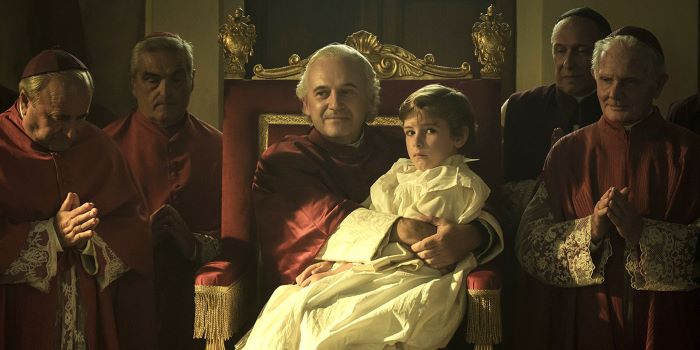Director Marco Bellocchio, still going strong at age 84, has been making highly charged films that have taken the social, moral, and political pulse of his native Italy for 60 years. Showing no signs of slowing down, Bellocchio has made, with his latest, an absorbing dramatization of a true story set in the mid-19th century that explores the unholy alliance of Roman Catholic and secular leadership and how it devastatingly impacts a Jewish family in Bologna.
Six-year-old Edgardo Mortara (played as a child by Enea Sala and as a young adult by Leonardo Maltese) is literally torn from his parents’ arms by the local authorities because Anna (Aurora Camatti), a former housekeeper, insists that she had him baptized when she thought he was dying when he was an infant.
In the Papal States in 1858, Christians could not live in the same household with non-Christians. Despite the flimsy evidence that the baptism actually took place (it’s basically just the word of Anna that she performed the ritual herself), Edgardo is taken from his family’s home and placed in a boarding school run by nuns, where he and other young non-Christian boys learn to become practicing Catholics.
With his usual sweeping flair and acute observation, Bellocchio fills the screen with indelible images that cast a wide net on anti-Semitic, mid-19th century Italian society and also the excruciating pain and loss felt by the Mortara family as their beloved son and brother remains forever out of their reach—Edgardo is the sixth of nine Mortara children.
When the parents, Salomone (Fausto Russo Alesi) and Marianna (Barbara Ronchi), visit their boy separately after being granted permission to do so by the Catholic authorities, it’s a horrifying moment for them to realize that Edgardo will not be able to return home. Marianna angrily pulls off Edgardo’s medallion of a cross given to him when he first arrived, and both she and her son are reduced to hysterical tears as she is led out of the room and he is dragged away. Soon after, there’s a brilliant sequence of the boy staring, almost uncomprehendingly, at a huge crucifix of Christ hanging on the chapel wall. After Edgardo climbs toward it, he imagines Christ coming down off the cross as if in sympathy for the pains that Edgardo himself is suffering.
Throughout, Pope Pius IX (Paolo Pierobon) refuses to return Edgardo to his family despite worldwide opposition, especially among the European press and public. His staunch public stance, which has painted him as an anachronism who is unable to lead the church into the modern world, causes him nightmares. In one, he’s visited by caricatures of Jewish leaders who carry out a painful and bloody circumcision on him.
The films that Bellocchio has made over the past 25 years (including My Mother’s Smile, Good Morning Night, Vincere, Dormant Beauty, and The Traitor) often unfold as hysterically fever-pitched melodramas hinging on notions of faith, idealism, and mortality. Kidnapped: The Abduction of Edgardo Mortara continues in that mode. Bellocchio is unafraid to go for broke telling this particular tale, accompanied by an often swelling orchestral score by composer Fabio Massimo Capogrosso that is interspersed with supremely well-chosen music composed by Sergei Rachmaninoff and Arvo Pärt. (It’s no surprise that the story of Edgardo Mortara has already been the subject of an opera: Italian composer Francesco Cilluffo’s The Mortara Case premiered in New York in 2010.)
Admittedly, the operatic heights Bellocchio reaches for—particularly in the intensely committed performances by Ronchi as Marianna, Sala as young Edgardo, and Pierobon as Pope Pius—might be pitched too high for some viewers, but it’s in keeping with the director’s audacious and fearless style and perfect for a film that mercilessly dissects how an uncaring institution destroys a God-fearing family.





Leave A Comment